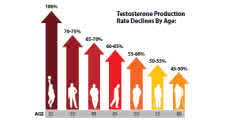Free Testosterone Levels Linked to Diabetes

BJU mt. 96: 867-870, 2005
Blood testosterone stays relatively constant throughout life, but the biologically active free testosterone declines drastically beginning at about age 50. Reductions in free testosterone are linked to decreases in muscle and bone mass, aggressiveness and self-confidence, sex drive,
impotence, insulin resistance and coronary artery disease.
Brazilian researchers found that men with low levels of free testosterone had an increased risk of developing type 2 diabetes. This disease is linked to an increased risk of heart attack, stroke, blindness, kidney failure, amputation and some types of cancer. Free testosterone levels
were influenced more by total body fat and central obesity.
Central obesity is an important risk factor of insulin resistance and type 2 diabetes, so both testosterone and free testosterone are important for health.